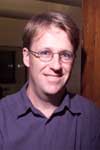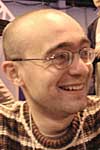Professor, Ph.D. student receive honors in supercomputing
By Steve KoppesNews Office
 Ian Foster |
University scientists for the second year in a row have earned a piece of a Gordon Bell Prize, one of the worldís top prizes for high-performance supercomputing.
The 2001 Gordon Bell co-recipients at Chicago were Ian Foster, Professor in Computer Science and the College and Associate Director of the Mathematics and Computer Science Division at Argonne National Laboratory, and Matei Ripeanu, a Ph.D. student in Computer Science. The award was announced at the November SC2001 conference on high-performance networking and computing in Denver.
Ripeanu also has won the $2,000 first prize of the 2001 Gnutella Research Contest.
Last year, a team from the University’s Center for Astrophysical Thermonuclear Flashes and their collaborators at Argonne and elsewhere received a Gordon Bell Prize for their simulation of an exploding star.
 Matei Ripeanu |
Sharing this year’s Gordon Bell Prize in the special category with Foster and Ripeanu were researchers at Germany’s Max Planck Institute for Gravitational Physics, Northern Illinois University and Argonne. The group was recognized for harnessing the power of multiple supercomputers to solve complex problems in physics that require substantially more resources than can be provided by a single machine.
Foster and Ripeanu’s use of the Globus Project played a key role in earning the award. Globus, based at Argonne and at the University of Southern California, is a research and development project intended to advance the technology and application of high-performance distributed computing.
Ripeanu won the 2001 Gnutella Research Contest for his technical analysis of the Gnutella network, a fully decentralized file-swapping alternative to Napster that has gained popularity with academics, researchers and Web users alike. Ripeanu mapped Gnutella’s configuration, analyzed its traffic patterns and suggested alternations that would improve its performance and flexibility.
![[Chronicle]](/images/small-header.gif)